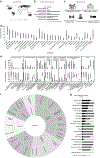International Care programs for Pediatric Post-COVID Condition (Long COVID) and the way forward
- PMID: 38287106
- PMCID: PMC12378996
- DOI: 10.1038/s41390-023-03015-0
International Care programs for Pediatric Post-COVID Condition (Long COVID) and the way forward
Abstract
Background: Pediatric Post-COVID-Condition (PPCC) clinics treat children despite limited scientific substantiation. By exploring real-life management of children diagnosed with PPCC, the International Post-COVID-Condition in Children Collaboration (IP4C) aimed to provide guidance for future PPCC care.
Methods: We performed a cross-sectional international, multicenter study on used PPCC definitions; the organization of PPCC care programs and patients characteristics. We compared aggregated data from PPCC cohorts and identified priorities to improve PPCC care.
Results: Ten PPCC care programs and six COVID-19 follow-up research cohorts participated. Aggregated data from 584 PPCC patients was analyzed. The most common symptoms included fatigue (71%), headache (55%), concentration difficulties (53%), and brain fog (48%). Severe limitations in daily life were reported in 31% of patients. Most PPCC care programs organized in-person visits with multidisciplinary teams. Diagnostic testing for respiratory and cardiac morbidity was most frequently performed and seldom abnormal. Treatment was often limited to physical therapy and psychological support.
Conclusions: We found substantial heterogeneity in both the diagnostics and management of PPCC, possibly explained by scarce scientific evidence and lack of standardized care. We present a list of components which future guidelines should address, and outline priorities concerning PPCC care pathways, research and international collaboration.
Impact: Pediatric Post-COVID Condition (PPCC) Care programs have been initiated in many countries. Children with PPCC in different countries are affected by similar symptoms, limiting many to participate in daily life. There is substantial heterogeneity in diagnostic testing. Access to specific diagnostic tests is required to identify some long-term COVID-19 sequelae. Treatments provided were limited to physical therapy and psychological support. This study emphasizes the need for evidence-based diagnostics and treatment of PPCC. The International Post-COVID Collaboration for Children (IP4C) provides guidance for guideline development and introduces a framework of priorities for PPCC care and research, to improve PPCC outcomes.
© 2024. The Author(s), under exclusive licence to the International Pediatric Research Foundation, Inc.
Conflict of interest statement
L.S. received support by the UK Foreign, Commonwealth and Development Office and Wellcome [215091/Z/18/Z] and the Bill & Melinda Gates Foundation [OPP1209135]. C.R.O. and E.P. were supported, in part, from grants by the National Institutes of Health (NIH) to C.R.O. (K23AI159518), its contents are solely the responsibility of the authors and do not necessarily represent the official views of NIH. T.S. is Chair of the Health Research Authority. All other authors have no conflicts of interest relevant to this article to disclose.
Figures



References
Publication types
MeSH terms
Grants and funding
LinkOut - more resources
Full Text Sources
Medical

